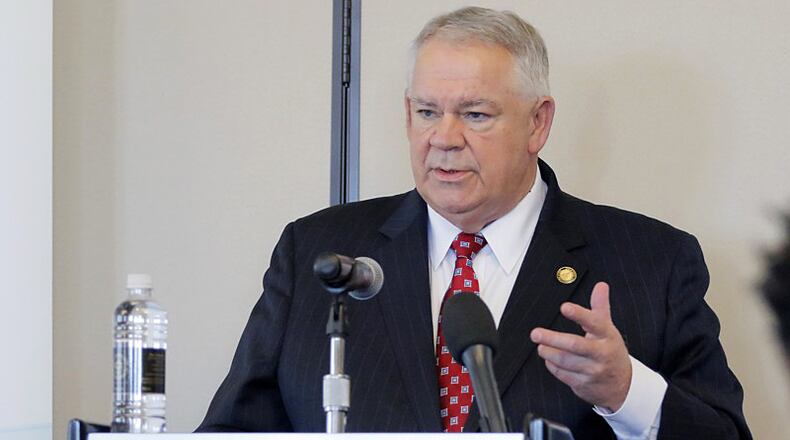House Speaker David Ralston on Monday announced plans for a measure that would cut the state income tax rate to 5.375%, the second rate cut since 2018.
Ralston, calling it a “comprehensive income tax reform” plan, said the measure would save taxpayers about $250 million a year.
“It would keep the promise we made to Georgians in 2018 and more,” Ralston said. “Every Georgian should pay less in state income tax once this becomes law.”
Analysts have questioned the tax cut math on similar legislation, saying some Georgians will pay higher taxes. If approved, the measure would go into effect next January, meaning the lower rates won’t impact state revenue until after the upcoming budget year.
House leaders have been pushing for a second cut in recent years to the state income tax rate and the measure is almost certain to come before the chamber later this week. Under legislative rules, bills have to pass at least one chamber by Crossover Day -- set for Thursday -- although there are ways around the rules.
Lawmakers voted in 2018 to reduce the top state income tax rate from 6% to 5.75% in response to federal tax changes that, officials thought, would force many Georgians to pay higher state taxes.
The first cut, in 2018, saved Georgians more than $500 million.
The 2018 legislation set up a second vote, in 2020, to lower the rate again to 5.5%.
Ralston said his proposal would eliminate the current graduated tax rate system and set a flat, 5.375% rate for individuals.
“It will make Georgia’s tax system fairer, flatter and allow Georgians to keep more of their money,” the speaker said.
Most of the saving are expected to go to upper-income Georgians, according to an analysis by the Georgia Budget & Policy Institute, which opposes a second income tax cut.
Ralston did not describe the full package in a speech Monday, but it would include a tax credit for some families and a tripling of the tax credit for families that adopt children.
The cost would be offset, somewhat, by other changes in tax law. For instance, the Georgia House leaders discussed last week eliminating the “double deduction” of state income taxes some Georgians can take on their tax returns.
If approved, it could raise taxes $130 million to $220 million on Georgians who itemize their deductions.
House Bill 1002 by House Ways and Means Chairman Brett Harrell, R-Snellville, would prevent Georgians from deducting the state income taxes they pay on both their federal and state income tax returns. Taxpayers could only deduct their state income taxes on their federal returns, under the measure.
Now, they can take the deduction on federal forms and use that reduced taxable income when they do their state taxes. Georgia is one of few states that allow that.
That double deduction can be lucrative for taxpayers who itemize their deductions rather than use the standard deduction.
More than 80% of Georgians use the standard deduction to reduce the amount of income that is taxed.
Harrell said his measure would raise state revenue -- and increase taxes on those who could no longer use the double deduction -- by $220 million.
At least for some taxpayers, the loss of that deduction, in theory, would be more than made up for by the lower top rate.
An Atlanta Journal-Constitution poll in January found that about 50% of voters favor keeping the current state income tax rate, against roughly 38% who want to see it cut again. An additional 9% said taxes should be increased. The remainder either said they did not know or refused to respond.
But this is an election year, and Ralston and House leaders are also fighting to maintain control of the chamber after Democrats picked up seats in 2018. Ralston has made tax cuts part of that partisan debate. “Republicans cut taxes,” he said Monday.
Some groups that rely on state funding said the General Assembly should be careful about slashing taxes, considering that budget cuts Gov. Brian Kemp ordered last fall were blamed, in part, on a slow-down in collections after the last tax cut.
“We request that lawmakers proceed cautiously when considering additional tax cuts during a time when the state has so many public service needs,” said Craig Harper, executive director of the Professional Association of Georgia Educators, the state’s largest teacher group.
About the Author
Keep Reading
The Latest
Featured


